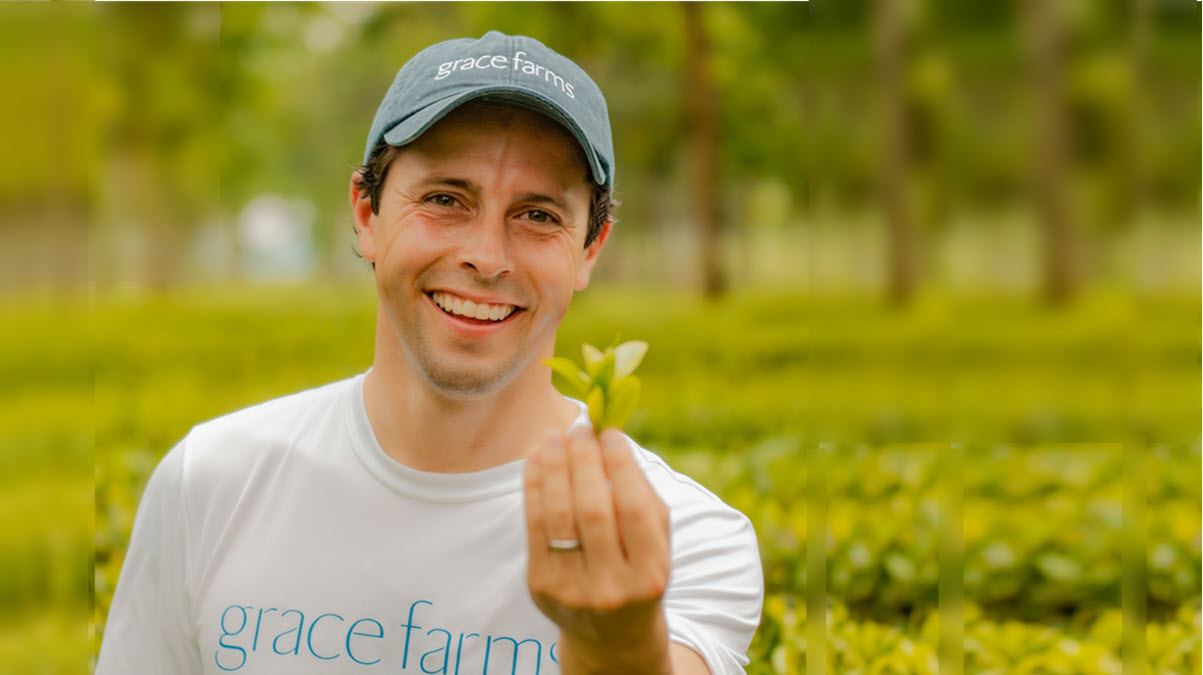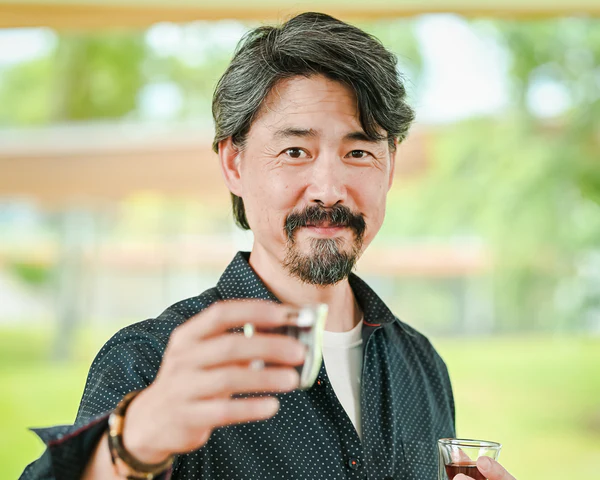Grace Farms Foods CEO Adam Thatcher says that even though slavery was abolished globally nearly a century ago, more than 28 million people are trapped in forced labor worldwide. Poverty and lack of access to education create opportunities for those who stand to benefit from the exploitation of vulnerable men, women, and children. In modern times, forced labor takes the form of work with little to no pay, fear and coercion, and restricted freedom of movement. This often occurs at the beginning of the supply chain when our tea is grown, food is harvested, our clothes are made, and the materials used in our buildings are extracted.
Listen to the Interview
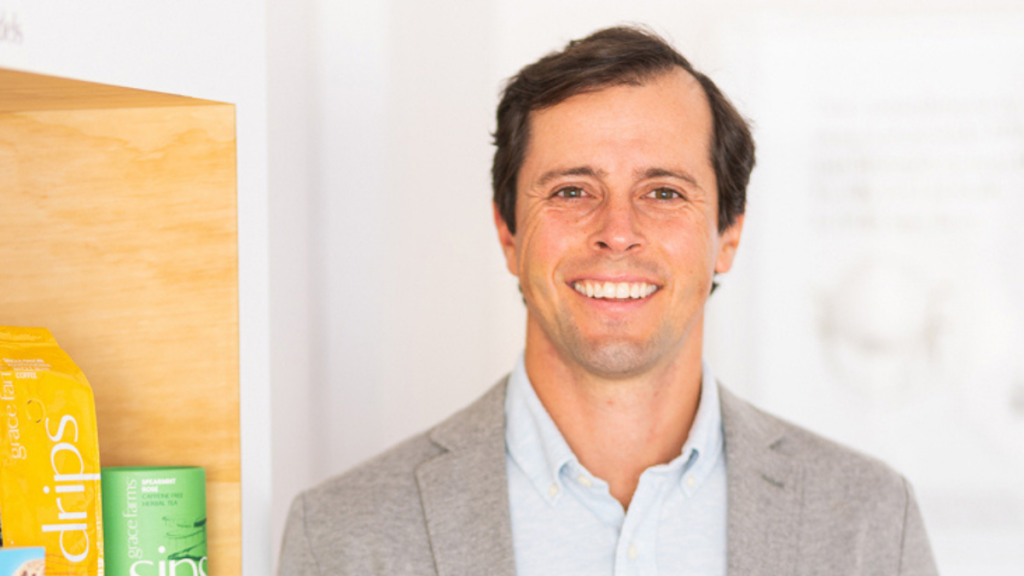
Ethically and Sustainably Sourced Tea
What makes our line of organic teas unique is that the herbal blends are naturally sweet ? much sweeter than you’d normally expect. They’ve got about 10% organic stevia leaf in them, just as if you were to pick it out of the garden. Since the success with those blends, we’ve been developing a line of black teas, and we’re getting ready to come out with green tea and wellness blends, says Grace Farm Foods CEO Adam Thatcher.
Grace Farms Foundation aspires to advance good in the world, providing a peaceful respite and porous platform to experience nature, encounter the arts, pursue justice, foster community, and explore faith.
Dan Bolton: Adam, welcome to the podcast. Tell us about your mission and vision and introduce our listeners to how the tea you sell plays a key role in improving suppliers’ lives.
Adam Thatcher: Thank you for having me on the program. I’m a big fan and very excited to share our story.
The story begins at this amazing place called Grace Farms. It’s a cultural and humanitarian Center in New Canaan, Connecticut, where we’re free and open to the public, we pursue justice, and where people can come and encounter the arts.
We also foster community at this place. We want to be open and welcoming and inviting to everyone.
Tea has played a critical role, tea being this common beverage that everyone enjoys around the world that conveys a sense of hospitality of welcoming from a host to a guest, but also the comforting nature that when you come to a new place, whether it’s at a friend’s house, or going to a place like Grace Farms, a nice warm beverage helps you lower your shoulders a little bit, find that commonality and then begin the dialogue.
So, our story with tea begins there. We expanded our tea game to another level when we established Grace Farms Foods, a public benefits subsidiary of Grace Farms Foundation created to share our signature coffees and teas with the world. And that’s really where we got started.
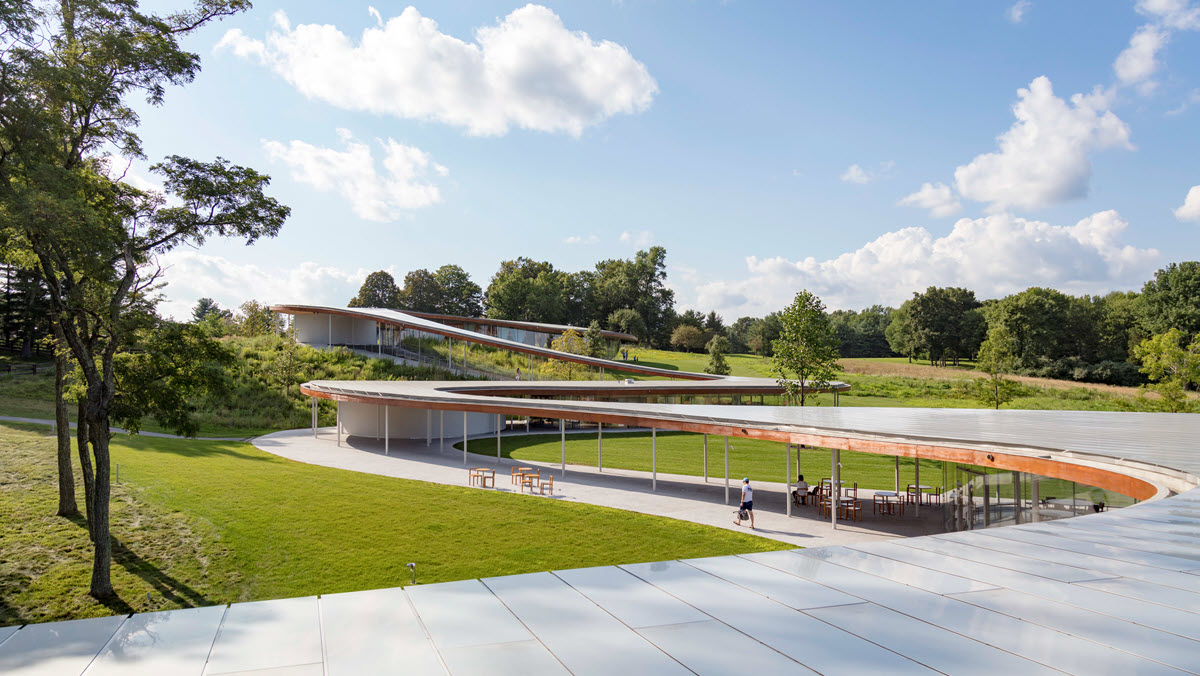
Dan: Your range of premium teas seeks to end forced labor and mirrors Grace Farms’ aesthetic: Making the world more just, sustainable, and peaceful. Will you tell listeners about your blends and sourcing strategy?
Adam: Our tea blends are unique because Grace Farms resident tea master Frank Kwei developed them.
Frank has welcomed hundreds of thousands of visitors to Grace Farms with a warm cup of tea and fantastic conversation explaining what Grace Farms is. Our first line of teas were organic herbal blends that are his own family recipes.
What makes them unique is that the herbal blends are naturally sweet, much sweeter than you’d normally expect. They’ve got about 10% organic Stevia leaf in them, just as if you were to pick it out of the garden. I find it hard to go back and drink a regular herbal tea like chamomile that doesn’t have this natural sweetness. And for us, it’s exciting because we’ve packaged a perfect blend all in one sachet, with no need to add sugar that probably isn’t organic and has been heavily processed.
Since the success with those blends, we’ve been developing a line of black teas, and we’re getting ready to come out with green teas and wellness blends, all using Frank’s expertise to come up with these inspiring blends.
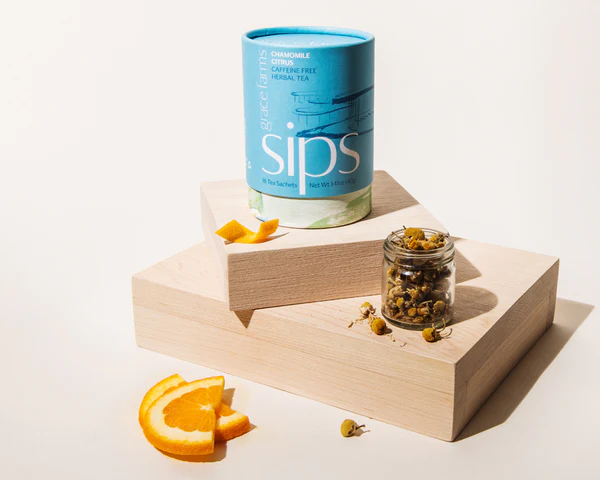
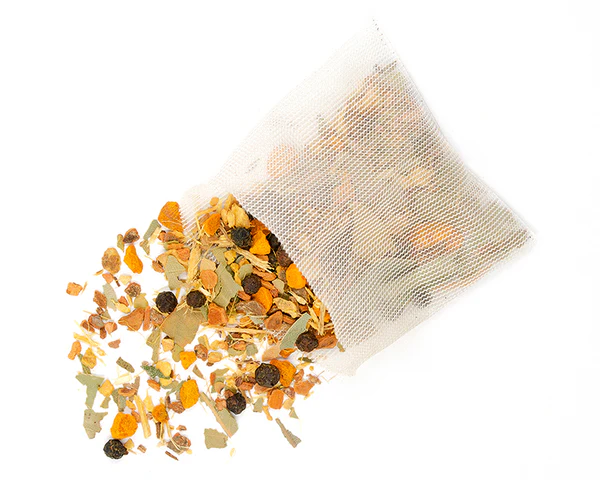
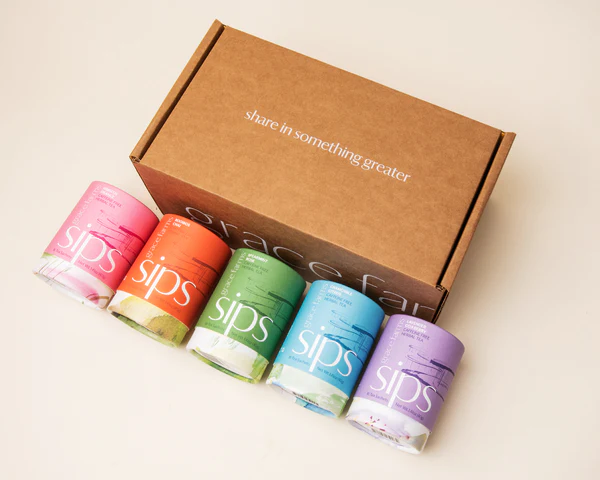
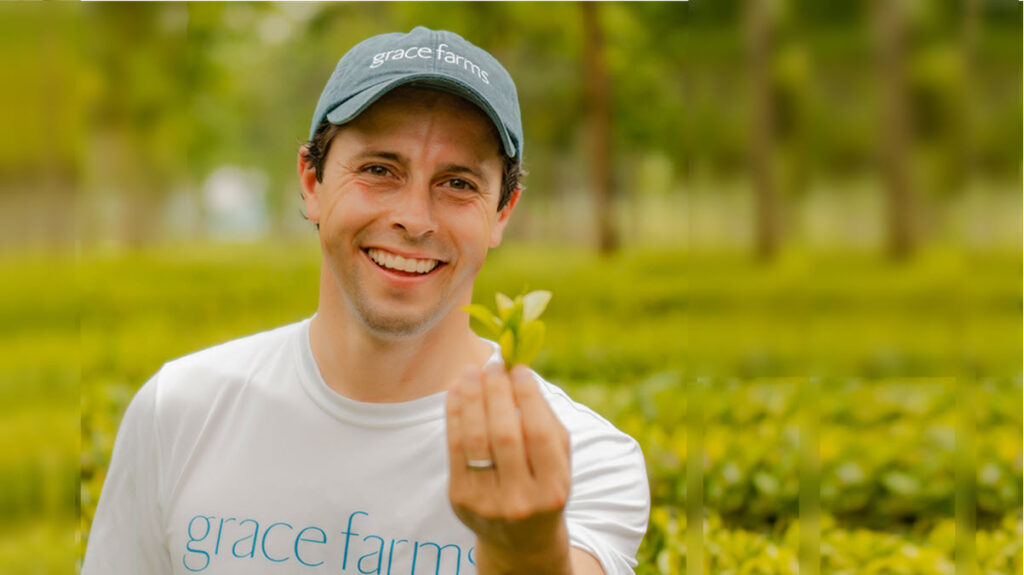
Dan: Where are you sourcing your teas from?
Adam: We source teas and herbals from around the world. So right now, our teas are coming from India and Sri Lanka. We’re now going to begin bringing in teas, green teas from China, and Matcha from Japan. The herbals come from a wide variety of places. For example, rooibos comes from South Africa, lavender from Croatia, and chamomile from Egypt. We are trying to find the best origins from a quality standpoint and then digging into the supply chain to ensure that they are ethically and sustainably produced, sourced, and traded.

Dan: Let’s talk about your concerns about forced labor and the problems associated with child labor. Describe for our listeners what can be done and how.
Grace Farms Foundation is a not-for-profit organization, and its stake in the ground is to end forced labor worldwide. It has a particular focus on supply chain analysis and a priority on the building materials supply chain because it sits at the interesting intersection of architecture and human rights.
Tea has given us this new opportunity to not only demonstrate through building materials, which is a very unconsumed friendly industry, right? You build a building once, and it lasts for 50 years, whereas tea is something that’s consumed daily. So, when we decided to start Grace Farms Foods, we ultimately decided to start it with three goals. The first is to share our signature teas with everyone. The second is to demonstrate and educate about ethical and sustainable supply chains. And the third is giving back 100% of the profits to support Design for Freedom. This initiative began at Grace Farms to stop forced labor in the architecture and construction industry.
We began building a program to demonstrate and educate about ethical and sustainable supply chains during the pandemic. The opportunity to travel to origin wasn’t an option, to begin with, so we started by saying, okay, how do we have some reassurance that we’re not participating in forms of child labor but also make sure that human rights are being respected and, and that fair pay is being given to those farmers or those tea workers for the work that they’re doing?
So, we looked at Fairtrade certification and changed our Fairtrade certifier to partner with Fairtrade International and the US branch of Fairtrade International, which is Fairtrade America; it’s the most globally recognized Fairtrade certification around the world. It began in Europe and works with FLOCERT. We saw this as an opportunity to lead the conversation in the tea industry here in the United States by partnering with Fairtrade International to become Fairtrade America’s first US brand to use Fairtrade-certified ingredients in our teas.
Fairtrade International has more rigorous standards, and it is producer-led. It focuses on smallholder farms and includes those stakeholders in every conversation, from setting standards to paying premiums and minimums to the ecology and environmental practices exhibited by these certified farms that we sourced from, so that was the beginning for us. But then that’s just using a third party to say, Okay, there’s been an audit, they’ve met our standards, but then there’s this need for what I think is the most important is that first party audit you going to the origin, meeting with the tea pickers, talking with the team managers, and making sure what they’re saying aligns with what the factory worker is saying, as you’re asking these questions, and getting to really immerse yourself in the culture. Tea in some of these areas around the world, like Darjeeling, is more than just a job or an industry. It is life. It is culture. And so, for us to experience that was incredibly validating. It creates an opportunity for long-term relationships when you find a partner with values alignment like your own.
Dan: Two-thirds of the transaction price is concentrated toward the retail end of the tea supply chain. How do you bridge the gap between a consumer paying a higher price and a producer not fully benefitting from that well-intentioned purchase?
Adam: As I mentioned, partnerships are the cornerstone to creating a fantastic and sustainable product, not only from the conventional view of sustainability, environmental and from humans, right said but also from a business side, right, because as you develop a stronger relationship and partnership, then you find more efficiencies, and you’re able to supply even a larger market. Our partnership began, ultimately, with a fantastic individual by the name of Kunall Patel, who is the owner and CEO of Davidson’s Organics.
In my opinion, all tea needs to be organic. It is crazy that the wide, very large share of the tea market is grown with pesticides sprayed on it and synthetic fertilizers put into it. This is a very, very lightly processed product that is put in a cup with boiling hot water poured on it. Then you drink it. So growing tea organically addresses two issues, the consumer’s health and the lasting effect on our environment.
Organic farming practices have been proven to protect soil health, improve water retention, create more resilient plants, and create a more reliable crop year after year. So that should be the non-negotiable, lowest common denominator the entire tea industry should be moving towards.
Now, beyond that, right? Let’s be honest, deforestation is also occurring because there is not a proper living wage for small farmers which is the reason they need to continue expanding their growing areas. The last consideration is whether the suppliers are using biodynamic practices. Biodynamic farming is essential. Intercropping with native species of trees and other shrubs that attract different types of microorganisms and insects that all benefit the soil health, not only helping to trap carbon tea, is actually a very effective plant at absorbing CO2 and trapping it in the soil. Biodynamic farming practices accelerate that process.
So, that’s where there needs to be buy-in, and that does have to come from consumers. Right? Consumers need to stop buying tea that’s not organic and does not meet those standards.
Our commitment is that the tea source will meet these minimum requirements. One of the reasons we chose to partner with Fairtrade International is because they have a whole Climate Resilience Program that helps educate the producers at origin on how to create more resilient farms and how to use more organic practices that will combat climate change.
As we grow and we’re able to generate a profit, nothing would make us happier than to continue to strengthen those relationships with the producers where we’re sourcing our teas.
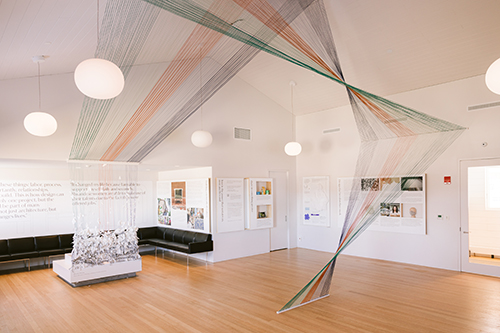
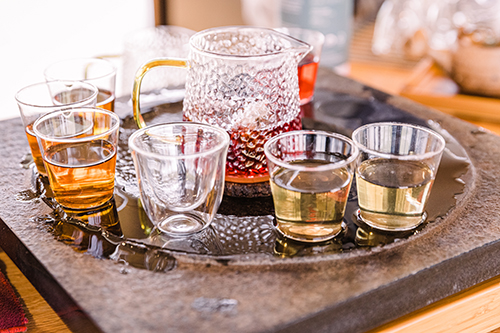


Grace Farms: The Season of Light
During the winter season, Grace Farms offers opportunities to reflect and engage in programs for people of all ages, from afternoon tea on Wednesdays, served by expert Frank Kwei, to helping those in need to listening to improvisational arrangements of seasonal music, to participating in one of our many programs related to our initiatives of nature, arts, justice, community, faith, and Design for Freedom.
As in all seasons, visitors are invited to explore our nearly 80 acres of natural landscapes and walking trails. For those interested in a deeper understanding of nature and our universe, there are a variety of facilitated programs such as bird watching and astronomy. Grace Farms is open and free to public six days a week.
Link to share this post with your colleagues
Signup and receive Tea Biz weekly in your inbox.
